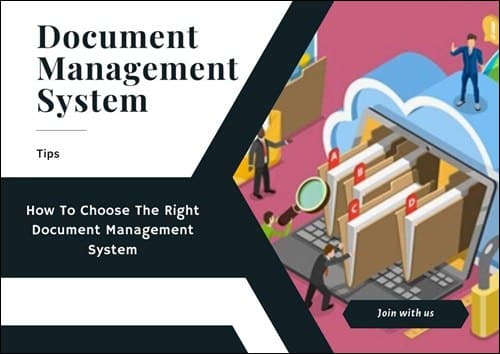Data is intrinsically important to any modern business. Sales and marketing reports, business and customer records, and other informational documents drive decisions that help businesses thrive and remain competitive.
However, it’s not enough to have access to the right data sets and documents. These documents are only useful and insightful if effectively managed. This is where a document management system can be beneficial.
What Is A Document Management System?
At its core, a document management system (DMS) is a software solution for capturing, securing, digitizing, and managing business documents and files.
Any DMS features a robust document capture software that can scan or digitize from any source, including paper files and external apps like customer relationship management (CRM) software. Then, it serves as a central repository for all business files and even allows for integration with existing business repositories to unify documents and eliminate data silos. DMS also facilitates document search and retrieval for business use.
Most DMS extends beyond these basic functionalities and includes document-related workflows. They feature valuable add-ons, capabilities, and features, including report management, advanced security features, and automation, providing a seamless experience and convenience in handling business documents.
Tips For Choosing The Right Document Management System For Your Business
Due to improved technology and the numerous benefits a DMS offers, businesses have more options than ever, making it challenging to know what to look for. So, here are tips to help you find the right one for your business.
1 . Understand The Two Types Of DMS
When searching for a document management system, you’ll come across two types: on-premise and cloud solutions. Each type of software offers the same functionality, but there are critical differences in the processes and how data is stored.
- On-Premise DMS
An on-premise DMS means that the software is hosted in your business’s IT infrastructure. With this type of solution, you need to provide your own storage and servers. This also means you’ll be in charge of system maintenance and the security of all your data. In general, on-premise DMS is most suitable for large corporations with dedicated IT staff and resources due to the high technical demand.
The most significant benefit of a self-hosted DMS is that you get direct and full control of the system. You don’t have to rely on other people to keep it up and running. Plus, you also don’t have to depend on the internet. Even if your connection goes down, you can still access your documents.
It’s costly, though. It comes with a considerable upfront cost since you need to provide the necessary IT infrastructure and staff to manage and maintain the system. There’s also a yearly expense for software updates. Plus, you’ll be responsible for the security and maintenance of the system.
- Cloud DMS
A cloud DMS means that the company’s data is stored in the cloud and accessible online. Cloud-based solutions generally require a monthly or annual fee that covers all software updates and maintenance activities. Pricing will depend on the software you choose and the features included.
Its biggest benefit is that you won’t need an in-house IT team to manage and maintain the system. So, there’s no significant upfront cost. You can simply log in to your system’s dashboard and access your files anywhere with an internet connection.
However, it removes control from your hands. You’ll have to rely on your provider to keep the software secure and functional. Also, cloud DMS relies heavily on the internet to access your document. So, if you have poor internet or your connection fails, you won’t be able to access your files. Plus, cloud solutions tend to have storage limits. So, the more data you want to store, the more expensive your subscription will be.
2 . Prioritize Security
When choosing a suitable DMS, data security should always be at the forefront of your decision.
Particularly for cloud-based DMS, you need to ensure your vendor offers rigorous security testing to protect your business documents and data. Make sure their practices are fully compliant with industry standards and regulations specific to your industry.
3 . Check For Integration Capabilities
DMS is all about streamlining and organizing all your company’s documents. For this reason, you’d want a system that can bring all your documents together into a fully integrated platform.
A good DMS should seamlessly work with all core business platforms and processes, such as CRM and accounting software. This helps eliminate the use of multiple fragmented systems for data entry and management, keeping everything consistent throughout your business.
Takeaway
Long gone are the days of bulky paper storage. With a sound document management system, you can set your business up for success by electronically storing and managing necessary documentation.
By following the above points, you should be able to choose the right one that will allow for better management of company documents, delivering value and efficiency, and ultimately boosting your business’s bottom line.

Leave a Reply
You must be logged in to post a comment.